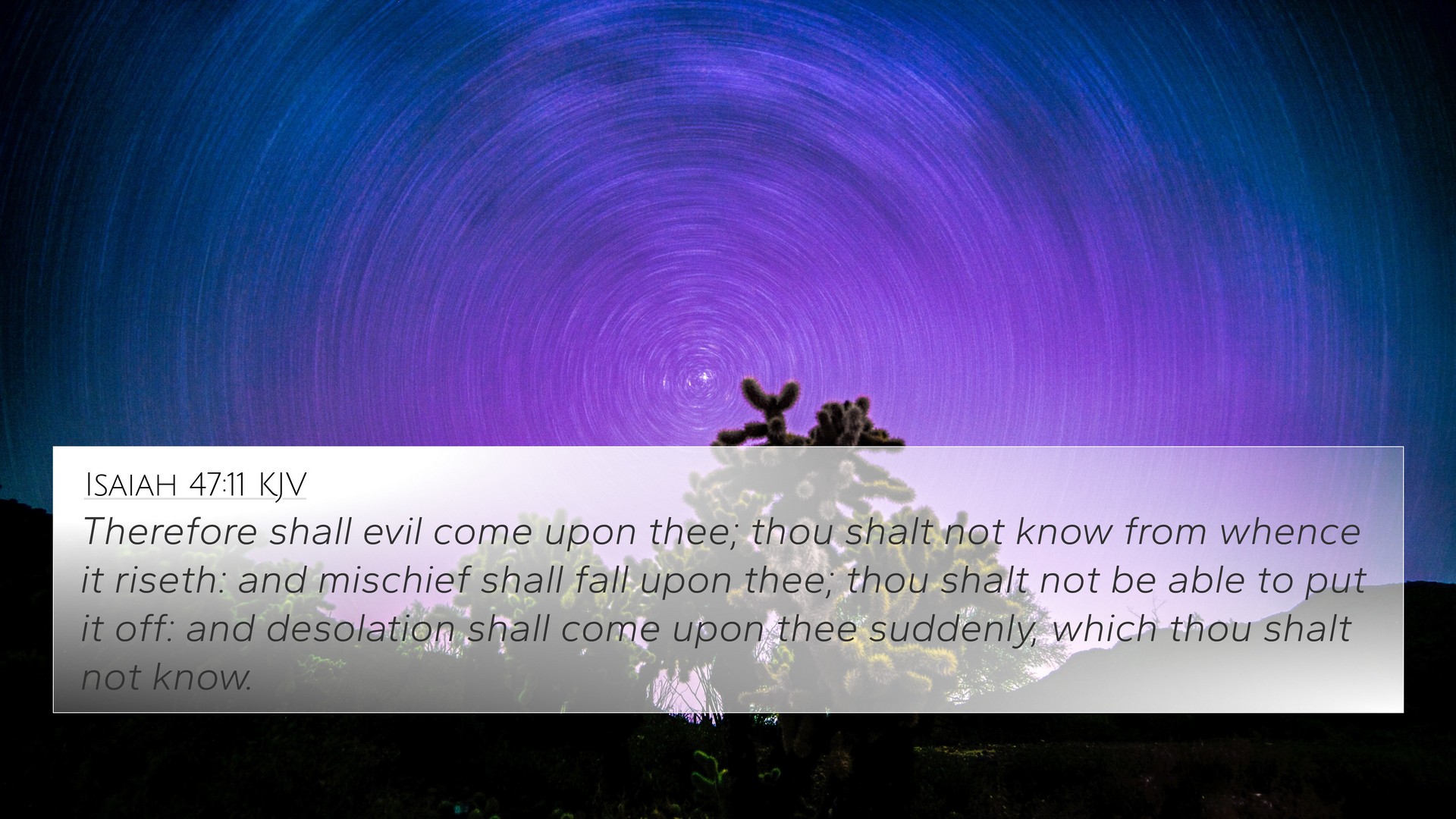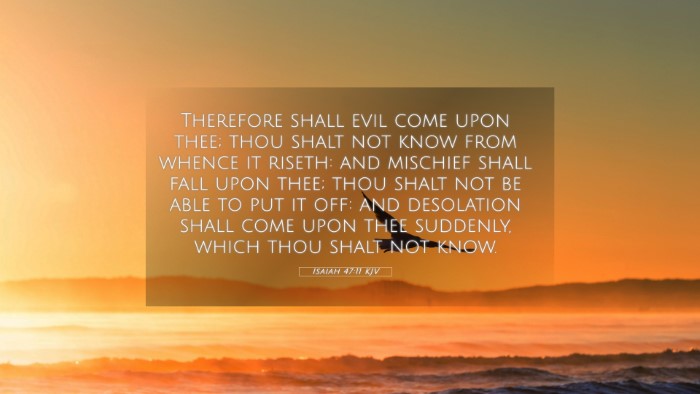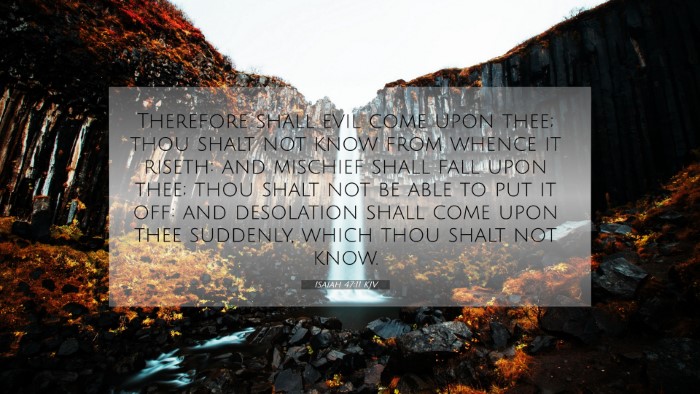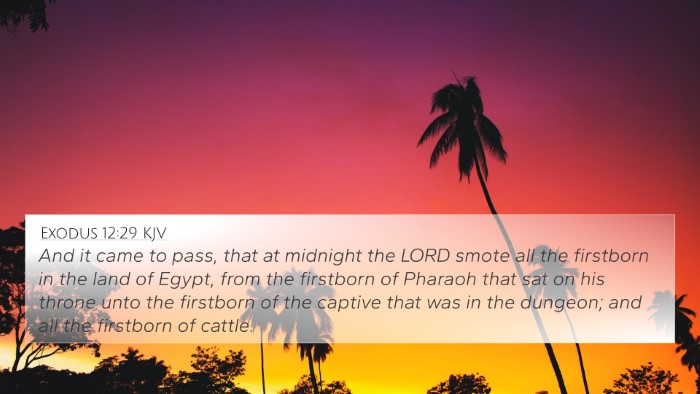Understanding Isaiah 47:11
Isaiah 47:11 states:
"But evil shall come upon thee, thou shalt not know from whence it riseth: and mischief shall fall upon thee; thou shalt not be able to put it off: and desolation shall come upon thee suddenly, which thou shalt not know."
Summary of Meaning
This verse serves as a stern warning to Babylon concerning the impending doom that will overtake it. It illustrates themes of judgment, divine retribution, and the inescapability of fate for those who have acted unrighteously.
Commentary Insights
-
Matthew Henry:
Henry implies that the prophecy conveys God's sovereignty over nations, indicating that Babylon’s pride and cruelty will not shield it from divine judgment. The certainty of their downfall is expressed by the assertion that evil and mischief will ambush them unexpectedly.
-
Albert Barnes:
Barnes emphasizes the sudden and unforeseen nature of the calamity that will strike Babylon. He suggests that despite their sense of security and strength, the nation will be caught off guard by the arrival of judgments, paralleling the downfall of great cities throughout history.
-
Adam Clarke:
Clarke interprets the verse as a profound reflection on the consequences of pride and arrogance. He stresses that the consequence of their sins—captivity and destruction—will arrive suddenly, underscoring a theme prevalent throughout the biblical narrative that emphasizes accountability for righteous behavior.
Cross-Referencing Biblical Texts
The following passages can be seen as related or supportive of the themes found in Isaiah 47:11:
- Proverbs 16:18: "Pride goes before destruction, and a haughty spirit before a fall." This highlights the dangers of arrogance and presages the downfall of the proud.
- Jeremiah 50:31: "Behold, I am against thee, O thou most proud, saith the Lord God of hosts: for thy day is come, the time that I will visit thee." A direct warning to prideful nations, emphasizing God’s commitment to justice.
- Revelation 18:2: "And he cried mightily with a strong voice, saying, Babylon the great is fallen, is fallen..." showing the ultimate fulfillment of Isaiah’s prophecy about Babylon’s destruction.
- Isaiah 13:19: "And Babylon, the glory of kingdoms, the beauty of the Chaldees' excellency, shall be as when God overthrew Sodom and Gomorrah." It reiterates the fate of Babylon as certain and impending.
- Ezekiel 30:6: "Thus saith the Lord; they also that uphold Egypt shall fall; and the pride of her power shall come down: from the tower of Syene shall they fall in it by the sword, saith the Lord God." A parallel caution against prideful nations.
- Job 20:5: "That the triumphing of the wicked is short, and the joy of the hypocrite but for a moment." This resonates with the core warning of impending mischief and downfall.
- Micah 1:12: "For the inhabitants of Maroth waited carefully for good: but evil came down from the Lord unto the gate of Jerusalem." This shows how expectations of good can swiftly turn to disaster through divine will.
Thematic Connections
Isaiah 47:11 connects thematically with various narratives in Scripture regarding divine judgment, the transient nature of earthly power, and the urgent call to humility. The concept that evil can arrive unexpectedly is echoed throughout both the Old and New Testaments.
Inter-Biblical Dialogue
The prophecies concerning Babylon and the broader themes of God’s judgment invite reflections that establish an intertextual framework. Observing the connections between Old Testament warnings and New Testament calls for repentance reveals the continuity of God's message throughout Scripture.
Tools for Bible Cross-Referencing
To deepen the understanding of Isaiah 47:11 and its connections, various tools can be helpful:
- Bible concordance: to find specific terms and verses.
- Bible cross-reference guide: which assists in identifying related scriptures.
- Cross-reference Bible study: encourages thorough examination of interconnected verses.
- Bible reference resources for sermon preparation: providing insights for preachers.
Conclusion
Isaiah 47:11 serves as a potent reminder of the realities of divine justice, the suddenness of judgment, and the futility of pride. Through careful cross-referencing and thematic exploration, one can glean profound insights into the nature of God’s dealings with nations and individuals alike.













